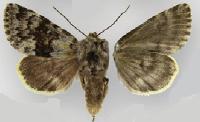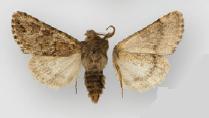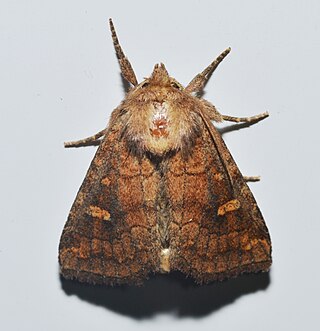
Lasionycta skraelingia is a moth of the family Noctuidae. It has a Holarctic distribution, occurring from Scandinavia to north-western North America. In North America this species is known from three specimens from Windy Pass, Ogilvie Mountains, Yukon.

Lasionycta taigata is a moth of the family Noctuidae. It occurs in open peatlands and fens in the taiga zone from Labrador, Churchill, Manitoba, and central Yukon, southward to northern Maine, northern Minnesota, and south-western Alberta.

Lasionycta fergusoni is a moth of the family Noctuidae. It is found from the southern Washington Cascades through British Columbia and Alberta to southern Yukon.

Lasionycta coracina is a moth of the family Noctuidae. It is found in the Richardson and British Mountains in northern Yukon, adjacent Northwest Territories, and Cape Thompson in north-western Alaska.

Lasionycta perplexella is a moth of the family Noctuidae. It is found from southern Yukon to southern Alberta and southern Washington.

Lasionycta subfumosa is a moth of the family Noctuidae. It is found from Victoria Island and Banks Island in the Northwest Territories and the Darby Mountains on the Seward Peninsula of Alaska.

Lasionycta lagganata is a moth of the family Noctuidae first described by William Barnes and Foster Hendrickson Benjamin in 1924. It is only known from three localities in south-western Canada: Banff and Waterton national parks in Alberta and the Purcell Mountains in south-eastern British Columbia.

Lasionycta carolynae is a moth of the family Noctuidae. It is found in the Ogilvie and Richardson Mountains in Yukon.

Lasionycta brunnea is a moth of the family Noctuidae. It occurs in the Rocky Mountains of Alberta north to Pink Mountain in north-eastern British Columbia, and in the Purcell and Selkirk Mountains in south-western British Columbia and north-eastern Washington.

Lasionycta caesia is a moth of the family Noctuidae. It occurs in the Cascade Mountains of northern Washington and the British Columbia Coast Range to 58 degrees north latitude.

Lasionycta gelida is a moth of the family Noctuidae. It is known from three specimens from the British Columbia Coast Range.

Lasionycta discolor is a moth of the family Noctuidae. It occurs in the Rocky Mountains of Colorado and on the Beartooth Plateau in Wyoming.

Lasionycta mono is a moth of the family Noctuidae. This species is known only from the type locality in the Sierra Nevada.

Lasionycta macleani is a moth of the family Noctuidae. It is known only from the east or southeast slope Mount McLean.

Psammopolia arietis is a moth of the family Noctuidae. It occurs on Pacific Coast sand beaches from Mendocino, California to south-western Alaska. It is absent from the inland Strait of Georgia.

Psammopolia wyatti is a moth of the family Noctuidae first described by William Barnes and Foster Hendrickson Benjamin in 1926. It occurs in western North America from southern Oregon to the Queen Charlotte Islands of British Columbia. The moth has been included in both 1983 and 2010 MONA indices.

Tricholita ferrisi is a moth of the family Noctuidae. It is only known from Onion Saddle in the Chiricahua Mountains and Ash Canyon in the Huachuca Mountains of extreme south-eastern Arizona at elevations between 1,575 and 2,325 metres. This is the Madrean Sky Islands region of the northern Sierra Madre Occidental's sky islands.

Tricholita signata, the signate Quaker, is a moth in the family Noctuidae described by Francis Walker in 1860. It is found in North America.

Tricholita chipeta is a species of cutworm or dart moth in the family Noctuidae. It was first described by William Barnes in 1904 and it is found in North America.
Tricholita notata, the marked noctuid, is a species of cutworm or dart moth in the family Noctuidae. It is found in North America.



